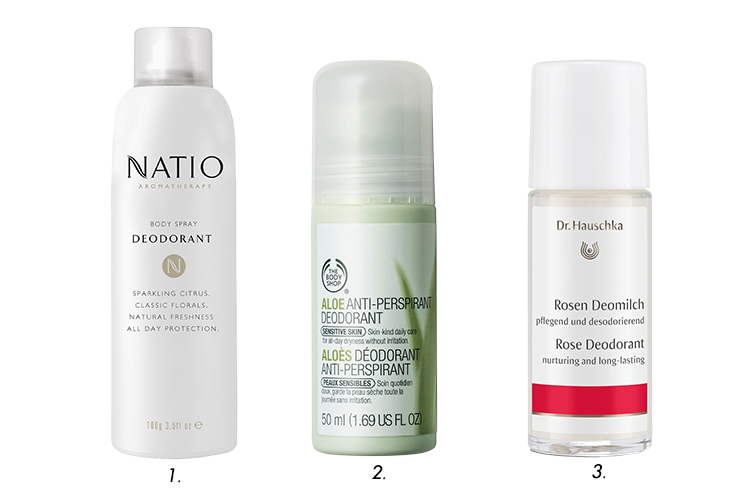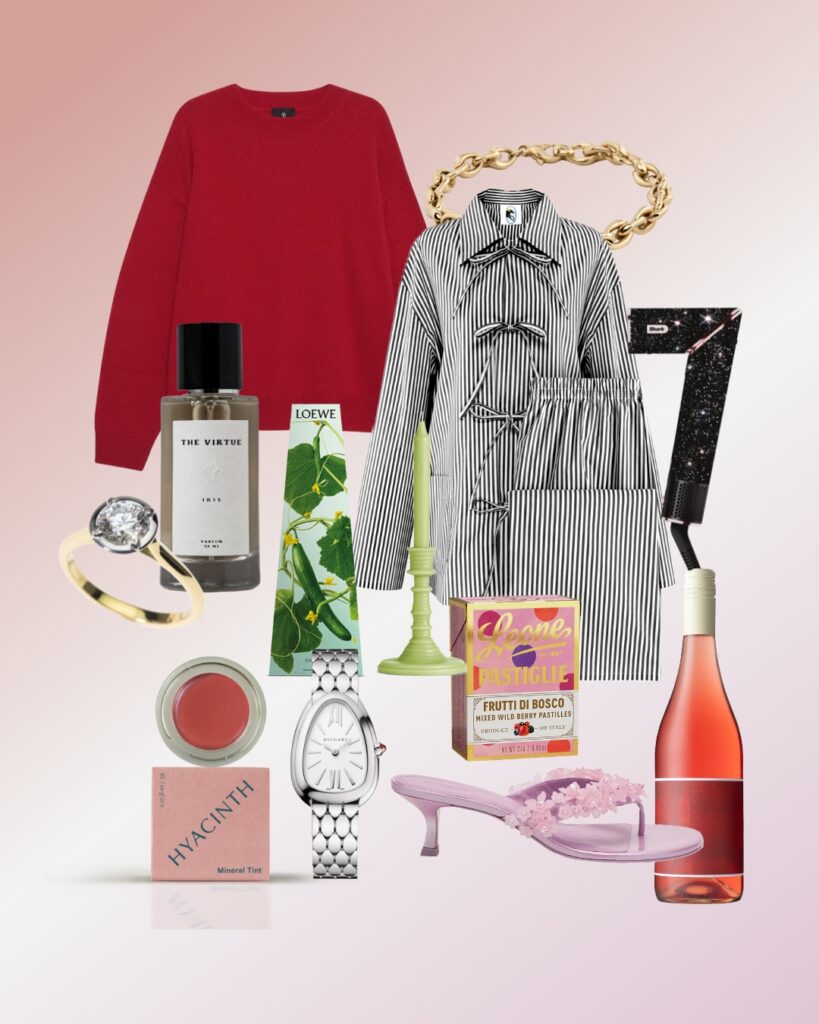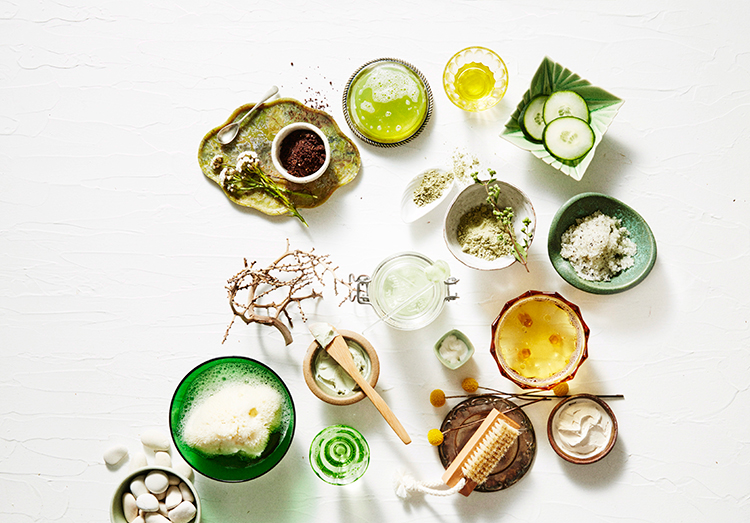
Our thirst for organic and natural skincare shows no sign of slowing down – there is a plethora of options out there to care for your skin that produce outstanding results, says Sarah Simpson.
In times gone by people were very divided on natural versus synthetic skincare. You had the die-hard earth mothers against the chemical warriors who opted for the latter because of the results they delivered. Fast forward to today and it’s fair to say that natural skincare has come along in a big way. The earth-scented concoctions with short shelf lives have made way for a bevy of products which are winning awards globally for results-driven promises and the adoration of millions.
Wellington company director, Elizabeth Barbalich of home-grown brand Antipodes, believes that ‘natural’ is now mainstream and hip. “More women are choosing to use natural/organic skincare based on a number of factors, not just how it smells and feels on the skin,” she says. “These consumers are making choices based on products that are good for their health, made from sustainable resources, organic, animal/cruelty free and vegetarian approved.”
As a beauty editor who is often spoilt for choice with products, I have to admit that I took some convincing that these natural alternatives could offer the hard-hitting results that the chemical competition offered. But I am happy to admit, my position has shifted. Aside from the benefits of natural skincare, it also can’t be ignored that there is most certainly a feel-good factor about using products that don’t leave a giant carbon footprint on our environment.
Corinne Morley, Trilogy in-house beauty expert, explains, “These days, thanks to constant innovation in natural and organic skincare, you can get the same, or indeed better, results without resorting to synthetics. There are some incredibly effective botanical ingredients, backed up with strong clinical data, which simply weren’t available a few years ago. There’s a huge and growing demand for skincare which is non-GMO and free from petrochemicals and silicone oils. Many women – and men, for that matter – are becoming concerned at the chemical overload inherent in our modern world and are looking for simpler, more natural alternatives to their favourite products.”
Once committed to ‘going green’, finding the products that live up to their claims is the tough part. Our experts agree, confusion begins at beauty counters, with words like natural, organic, and certified organic.
Natural selection
There’s no denying that the term ‘natural’ is popular. Something can contain a sniff of a natural ingredient and this can then be plastered all over the packaging. Essentially, natural should mean ingredients from nature, regardless of what agricultural practices are in place. It doesn’t mean ‘nature identical’ which infers man-made synthetic chemicals. However, it’s a case of buyer beware because this is largely an area that isn’t regulated. A company can label or describe products as organic or natural, even if they contain only a tiny amount of organic or natural ingredients. Our selection contains no artificial colour, synthetic fragrance, or petroleum products, however natural preservatives are present to prolong the shelf life.
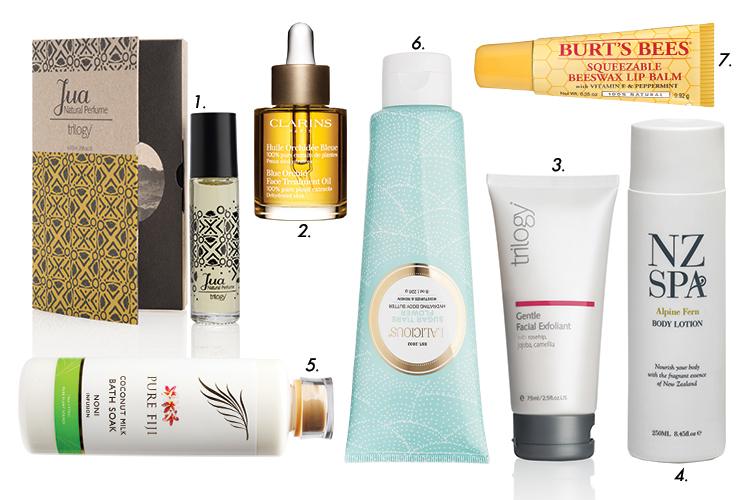
Our picks: 1. Jua Natural Perfume, by Trilogy, $25. 2. Clarins Orchid Blue Plant Oil, $60. 3. Trilogy Gentle Facial Exfoliant, $40. 4. NZ SPA Alpine Fern Body Scrub, $32. 5. Pure Fiji Coconut Milk Bath Soak, $46. 6. LALICIOUS Sugar Tiare Flower Hydrating Body Butter, $55. 7. Burt’s Bees Squeezeable Beeswax Lip Balm, $12.
Organic & Certified Organic
Organic is a trendy word that manufacturers know is attractive, so you should look for association symbols to make sure you have the real thing. “The only way customers can be assured that they are purchasing genuine organic products, free of synthetic chemicals, is to purchase products which have been organically certified with a leading independent certifying body such as BIOGROW and AsureQuality (New Zealand Certified Organic),” says Barbalich. “Such products must have 100 per cent natural ingredients with 70 to 95 per cent of these certified organic. Strict international criteria governs the remaining ingredients.” Another word common to organic products is biodynamic. This is when farmers not only exclude the use of chemicals, they also plant and harvest crops by phases of the moon. Demeter is the official body for biodynamic farming and Weleda and Dr Hauschka adhere to the principles.
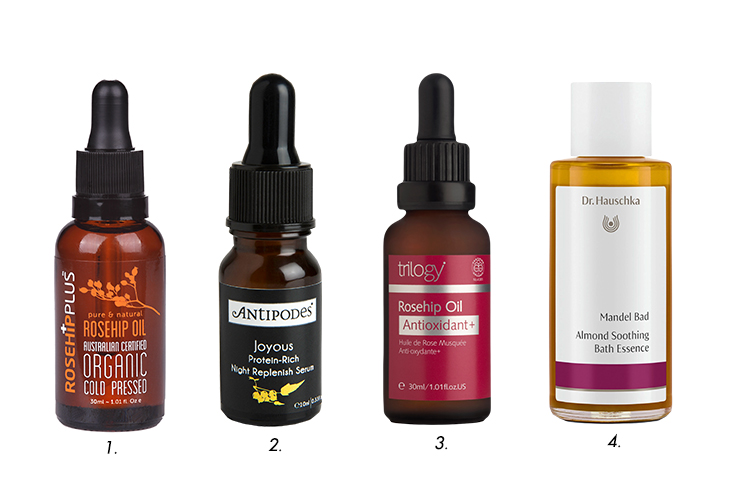
Our picks: 1. RosehipPLUS Rosehip Oil, $16. 2. Antipodes Joyous Protein-Rich Night Replenish Serum, $58. 3. Trilogy Rosehip Oil Antioxidant+, $36. 4. Dr. Hauschka Almond Soothing Bath Essence, $44.
Crowning Glory
Effective sulfate-free hair cleansing products are now plentiful and Pureology is a 100 per cent vegan range which contains organic botanicals (very concentrated so it lasts for months). Natural hair care is much more than shampoo. Ammonia and resorcinol are the chemicals commonly used to deepen or lighten the natural colour of your hair and the Tints of Nature range is free from both – while very gentle on the hair, it still does a good job of covering grey. Even synthetic hair oils have been replaced by natural alternatives.
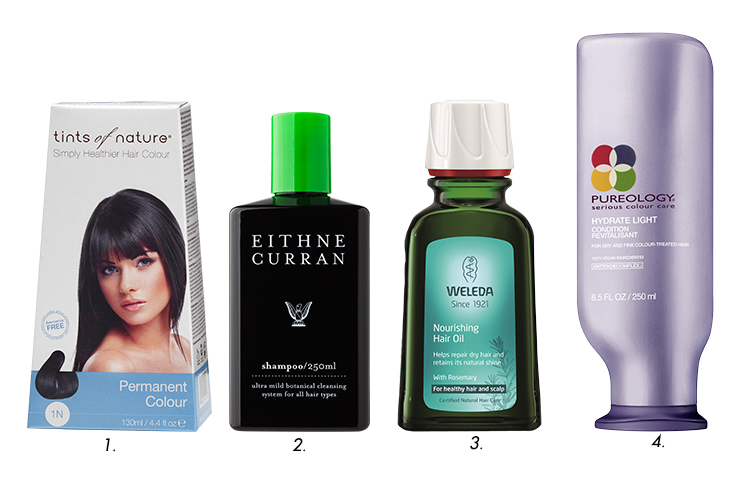
Our picks: 1. Tints of Nature Permanent Hair Colour, $27. 2. Eithne Curran shampoo, $46. 3. Weleda Nourishing Hair Oil, $20. 4. Pureology Hydrate Light, $43.
Under Investigation
Deodorant got a bad rap in the early 90s due to rumours surfacing on the internet that it could be linked to breast cancer. Fortunately cancer research institutes around the world have found no link between breast cancer tumours and the use of regular antiperspirants or deodorants. If you have concerns or just want your whole regime to be more natural, mineral salts, hemp oil and aloe vera with sweet smelling essential oils offer the protection busy women need without the parabens and aluminium.
